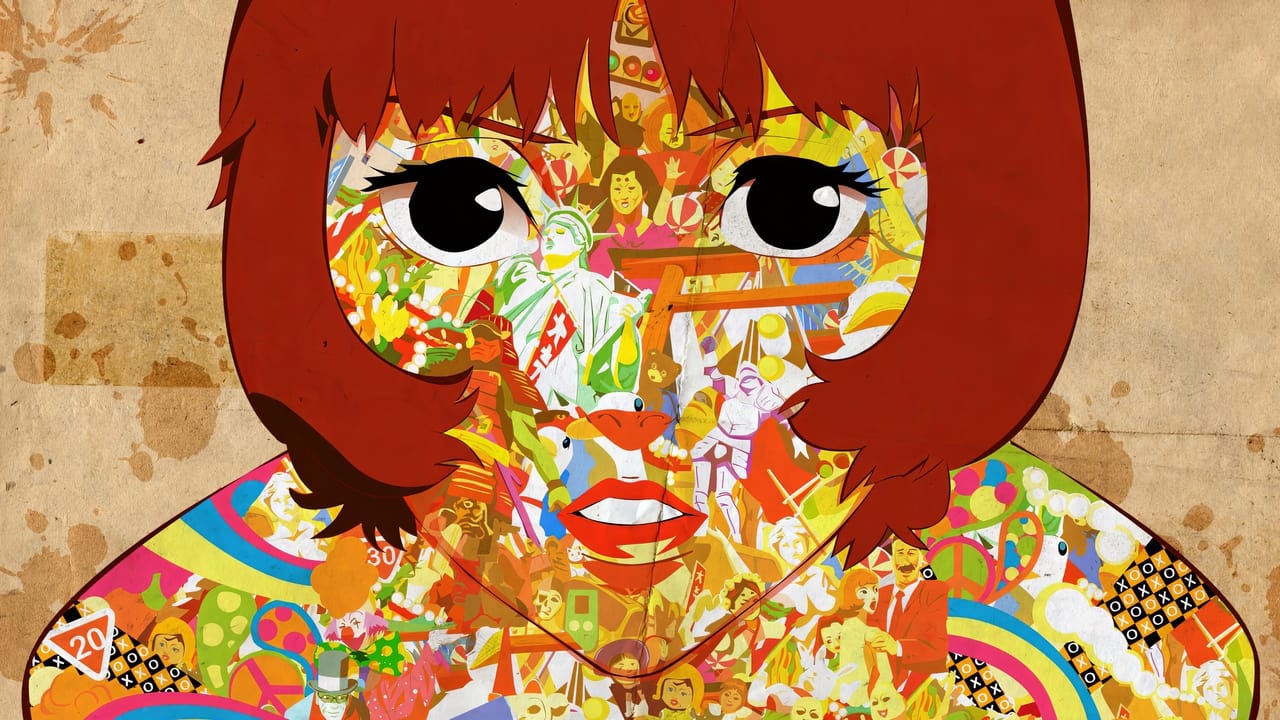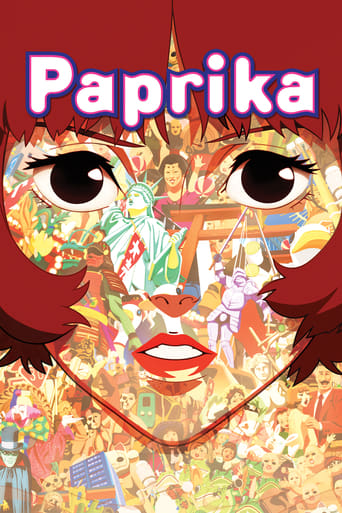

Unshakable, witty and deeply felt, the film will be paying emotional dividends for a long, long time.
... View MoreLet me be very fair here, this is not the best movie in my opinion. But, this movie is fun, it has purpose and is very enjoyable to watch.
... View MoreOne of the most extraordinary films you will see this year. Take that as you want.
... View MoreThere's no way I can possibly love it entirely but I just think its ridiculously bad, but enjoyable at the same time.
... View MoreThis is a good anime movie but it can have weird moments if you are not fully use to Japanese or mature movies. For example we see Morio and Seijiro merge into one body while having too heads and in another Morio inappropriately touches Paparika when she is tied up and even puts his hand right through her jeans, up her shirt and rips off her face to reveal Atsuke on that side note she is seen naked and you might see her nipples and breasts. Although Paparika's origin was never revealed in this movie. I kept on wondering how did Atsuke gain the ability to change into Paprika. The music beautiful and memorable and the voice actors were good. This is definitely one of Cindy Robinsons good projects. If you want something mature in terms of anime movie I would recommend you check this out.
... View MorePaprika is a kaleidoscopic and phantasmagoric animated thriller, a bewildering ride through dreams mixed with more dreams mixed with waking life. Now for some films, if you do not get what its makers are trying to say, it is lost on you. This is not so with Paprika. This is the kind of film one can watch and find highly entertaining without having much of a clue what it is about. The "Parade of Everything" is quite a sight for lovers of whimsy and fantasy, symbols and the surreal. While there are various weak points to the film, but there is not much point to mentioning them. Why? Well, when something goes for it on a grand scale, as Paprika does, it is better to watch and appreciate what it does right. Beyond the vibrant images, the direction does something special with the choreography, the movement on-screen. You get this wonderful feeling of animation, everything brought to life by imagination and the mind. So if you enjoy crazy dreams or the carnivale, definitely give Paprika a view.
... View MorePaprika must have inspired Inception on some level, I'm sure of it. The film tells a story about a corporation that has come up with a machine that enables psychiatrists to infiltrate dreams and to help their patients through intensive dream therapy. Obviously something goes wrong along the way and its up to our protagonists to sort out the mess before the collective dreaming of the world comes to an end.Whereas Inception relies on heavily defied rules of dreaming and the aesthetic of gangster movies to pull in its viewers, Paprika is just plain weird. All the various dreams are heavily symbolic, full of bizarre creations and scenes and make little to no sense at all. Both styles have their pros and cons, and Paprika does a good job of lending credibility to its artistic view. It's a gorgeous movie with a soundtrack that easily keeps up and contains quite a few earworms. The story itself is slightly convoluted and very fast-paced, but not so much that it becomes unwatchable. It's a movie that requires your full attention, but I cannot really see that as a flaw.Furthermore, the various characters are all individualistic, sympathetic and nicely animated. Paprika, the eponymous dreamwalker persona of Chiba Atsuko, is especially a simple delight to watch and follow. Cheerful, determined, peppy, charismatic. A great protagonist, in a nutshell. The villain of the movie isn't as strong in comparison, but (s)he's not horrible by any means.I'd say that Paprika is a great gateway into anime. It represents the best of its kind, is a fully realized cinematic experience, yet the trademark weirdness of anime is perfectly explained by its premise so it doesn't feel alienating to first-time viewers. It's colourful, it's fun, it's thoughtful, it's all around satisfying.
... View More"I'm sick of following my dreams. I'm just going to ask them where they're going and then hook up with them later." - Mitch Hedberg Most of Satoshi Kon's animated films ("Perfect Blue", "Millennium Actress" etc) feature non-linear narratives which deftly merge pasts, presents, futures, dreams, fantasies and realities. His final feature, "Paprika", is no different.Though confusing at first glance, peel back its many layers and "Paprika" offers a fairly simple tale. Here we have a repressed psychologist who "enters the dreams" of patients in order to "fix them" and "make them more ordered". To do so, she creates a fantasy heroine called Paprika, a pixie-girl who embodies all the qualities the psychologist wishes she herself possessed. The irony of creating a fantasy to destroy the fantasies of others is lost on the psychologist.Next we have three emasculated men, one clinically obese, one wheelchair bound and one a police officer. The wheelchair bound figure seeks to symbolically "destroy all those who meddle with dreams". Why? Because dreams have become his chief means of achieving happiness, fulfilment and self-actualisation. Burnt by life, he depends heavily on, and retreats further into, his carefully groomed dreamscapes. Needless to say, Kon's "dreams" serve as metaphors for a wide range of "things". They represent everything from internet chat rooms to video games, movies, TV, drugs, sex, prostitutes, food and so on. His "dreams", then, are representative of any all human escapes or coping mechanisms.The cop, meanwhile, enters various dreams as a means of curbing his real life anxieties. Ingeniously, his meetings with Paprika occur in seedy locales, their psychoanalysis sessions resembling sexual liaisons with escorts or call girls. Other characters include a socially withdrawn computer programmer (symbolic of Japan's Hikkomori) and an assistant who acts out various rape fantasies. Virtually all the film's characters are psycho-socially messed up (nods to addictions, masturbation, alienation etc), Kon alluding to a Japan in which modern techno-capitalism has bred all manners of perversions and dysfunctions. The film's dream sequences, most of which feature a mysterious "marching band", are themselves packed with symbolic references to Japanese culture (lots of consumer objects, politicians, religious symbols etc). Elsewhere, billboards, advertisements and the glittery snake-oils of a hyper-consumerist culture bleed incessantly into and out of one another. Every commercial, jingle or pop-song is but another fantasy to be flirted with or discarded. By the film's ends, the dangers of fantasy (the social disconnection, violence, extreme egoism, sexism or misogyny they foster) are acknowledged, but also the emancipatory power of "dreams" as well, be they an individual or communal activity.Aesthetically, "Paprika" is strong, with mind-bending visuals and a memorable score. This being a Japanese animation, there's the obligatory tentacle-rape sequence, a bizarre fetish which goes all the way back to Hokusai's "The Dream of the Fisherman's Wife", and perhaps further. "Paprika's" climax is somewhat derivative, with its generic light-shows and gigantic apparitions, but it's nevertheless Satoshi Kon's strongest feature since "Perfect Blue". See "Existenz", "The Girl Who Leapt Through Time", "The Sky Crawlers", Sang-ho Yeon's "The King of Pigs" and "Demonlover".8/10 – Worth two viewings.
... View More